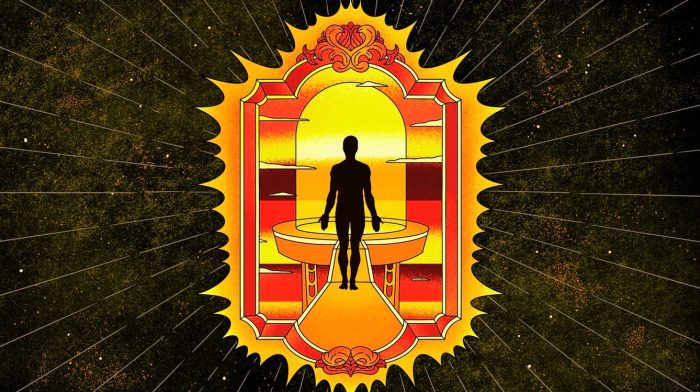Posts Tagged ‘Chance and Necessity’
“Real generosity towards the future lies in giving all to the present”*…
Iwan Rhys Morus suggests that we’re enthralled to a Victorian paradigm that haunts us still: the idea that inventors and entrepreneurs hold the keys to the utopian future…
Tech titans like Elon Musk and Jeff Bezos present themselves as men who could single-handedly shape the future. For their supporters, their ruthless drive toward success is their key virtue. And their showmanship — Musk sending a Tesla Roadster into space on a Falcon Heavy rocket, or Bezos sending Captain Kirk into orbit with Blue Origin — is a way of demonstrating that virtue and asserting they are in control.
We owe to the Victorians the idea that there is a firm link between virtue and technological agency. They established a powerful paradigm that continues to haunt us: that the future is (or can be) a utopia, and inventors and entrepreneurs are the ones who know how to get there.
While our notions of virtue have shifted today, we still assume that future-making is the prerogative of very specific sorts of innovators — even as their imagined identities have fractured and transformed. The assumption that innovation is the property of charismatic individuals still underlies the way we think about technology.
…
The seductive power of Victorian thinking about the relationship between character, technology, and the future remains pervasive, even if views about just what the proper character of the inventor should be have shifted….
With its focus on individual virtue, the Victorian vision of the future is an exclusive one. When we subscribe to this paradigm about how — and by whom — the future is made, we’re also relinquishing control over that future. We’re acknowledging that tomorrow belongs to them, not to us.
“Back To The Victorian Future,” by @irmorus1 in @NoemaMag. Eminently worth reading in full.
* Albert Camus
###
As we ponder power and its purpose, we might send inclusive birthday greetings to Jacques Lucien Monod; he was born on this date in 1910. A biochemist, he shared (with with François Jacob and André Lwoff) the Nobel Prize in Physiology or Medicine in 1965, “for their discoveries concerning genetic control of enzyme and virus synthesis.”
But Monod, who became the director of the Pasteur Institute, also made significant contributions to the philosophy of science– in particular via his 1971 book (based on a series of his lectures) Chance and Necessity, in which he examined the philosophical implications of modern biology. The importance of Monod’s work as a bridge between the chance and necessity of evolution and biochemistry on the one hand, and the human realm of choice and ethics on the other, can be seen in his influence on philosophers, biologists, and computer scientists including Daniel Dennett, Douglas Hofstadter, Marvin Minsky, and Richard Dawkins.


You must be logged in to post a comment.